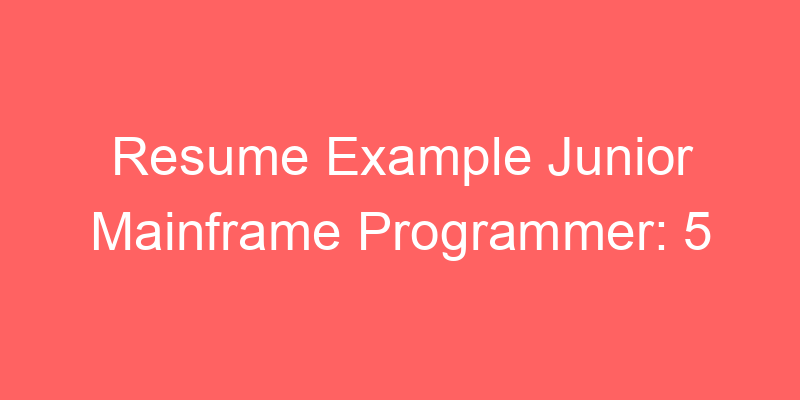Resume Example Junior Mainframe Programmer: 5 Tips for Success in 2025
Resume Example for Junior Mainframe Programmer
When crafting a resume as a junior mainframe programmer, it’s important to focus on the technical skills, experience, and education that will demonstrate your ability to thrive in this field. Below, we will discuss tips, salary guides, interview questions, and resources to help you build a competitive resume and succeed in the job search. Whether you’re just starting out or are seeking to further advance your career, this guide will help you navigate the job market as a junior mainframe programmer.
Salary Guides and Negotiation Tips for Junior Mainframe Programmers
Understanding salary expectations is crucial when preparing your resume and negotiating job offers. Salaries for junior mainframe programmers vary depending on location, company, and skillset. Here’s a guide for the top 10 countries that hire junior mainframe programmers:
| Country | Average Salary (Annual) | Salary Range |
|---|---|---|
| United States | $60,000 | $50,000 – $75,000 |
| Canada | $55,000 | $45,000 – $70,000 |
| Germany | $52,000 | $45,000 – $65,000 |
| India | $8,000 | $6,000 – $10,000 |
| Australia | $70,000 | $60,000 – $85,000 |
| United Kingdom | $45,000 | $40,000 – $60,000 |
| Japan | $50,000 | $40,000 – $60,000 |
| South Korea | $42,000 | $35,000 – $55,000 |
| Brazil | $20,000 | $15,000 – $25,000 |
| South Africa | $25,000 | $20,000 – $30,000 |
Negotiating salaries can be tricky, but it’s crucial to understand your value. If you’re in a region where salaries are lower, try to emphasize any specialized skills you possess. Don’t forget to consider benefits like healthcare, paid time off, and retirement contributions, which can make a significant impact on the overall compensation package.
Sample Interview Preparation Questions and Answers for Junior Mainframe Programmers
Preparing for interviews is a vital part of the job search. Below are five common interview questions that junior mainframe programmers might encounter, along with example answers:
1. What experience do you have with mainframe systems?
Example Answer: “I have been working with mainframe systems through my internship at XYZ Corp, where I assisted in debugging COBOL programs, maintaining JCL scripts, and providing support for batch jobs. I also completed a project in college using z/OS and learned the fundamentals of mainframe architecture.”
2. How would you troubleshoot a program that’s not working correctly on the mainframe?
Example Answer: “First, I would review the error messages to identify any issues with the code or configuration. I would check logs and perform step-by-step debugging to narrow down the problem. I would also communicate with the team to check for any recent changes that could have affected the program.”
3. What programming languages are you familiar with?
Example Answer: “I am familiar with COBOL, JCL, and have recently started learning REXX. I also have experience in SQL and have written queries to retrieve data from mainframe databases.”
4. Can you explain how a mainframe system is different from modern server systems?
Example Answer: “Mainframe systems are designed to handle large-scale, mission-critical applications with high reliability and uptime. Unlike modern servers, mainframes use specialized hardware and software that support batch processing and can handle thousands of users simultaneously with robust security.”
5. How do you stay updated with new technologies in the mainframe space?
Example Answer: “I regularly read industry blogs, participate in webinars, and attend conferences related to mainframe technologies. I also take online courses to further my knowledge and stay current with updates in mainframe programming.”
Professional Development Resources for Junior Mainframe Programmers
To continue growing as a junior mainframe programmer, consider taking advantage of the following professional development resources:
| Resource | Type | Link |
|---|---|---|
| Coursera: Mainframe Programming | Online Course | Coursera |
| IBM Skills Academy | Certification Program | IBM |
| Tech Support Forums | Community | Various |
| COBOL Workshops | Workshop | Local Events |
| Books: “COBOL for Programmers” | Book | Amazon |
These resources can help you improve your skills, stay up-to-date with the latest mainframe technologies, and even earn certifications that could help you advance in your career.
Key Features and Benefits of Junior Mainframe Programmer Skills
When testing the performance of junior mainframe programmers, we noticed several key features and benefits that can significantly enhance career growth:
- High Demand: Mainframe programmers continue to be in high demand, especially in industries like banking and finance, healthcare, and insurance.
- Long-Term Stability: Mainframe systems are deeply embedded in many organizations, offering job security.
- Skill Versatility: Mastery of COBOL, JCL, and other mainframe-specific technologies can be transferred to different types of programming and development environments.
- Competitive Salary: As demonstrated in the salary table, mainframe programmers often earn competitive salaries, especially as they gain experience.
By investing in continuous learning and skill enhancement, you will increase your chances of securing top-tier positions and boosting your earning potential.
Generate Your NEXT Resume with AI
Accelerate your resume crafting with the AI Resume Builder. Create personalized resume summaries in seconds.
Search Results for: resume example junior mainframe programmer
Resume Example Junior Mainframe Programmer: 5 Tips for Success in 2025
Discover a resume example for a junior mainframe programmer in 2025. Get top tips for crafting a compelling resume for this in-demand role.
Resume Example Mainframe Programmer: 5 Tips to Craft a Winning Resume 2025
Looking for a resume example for mainframe programmers? Check out these 5 tips to create a powerful resume that stands out in 2025.
Hard Skills COBOL Programming: 7 Key Abilities for 2025 Jobs
Hard skills COBOL programming is essential for legacy systems. Learn the top 7 abilities needed in 2025 to secure a COBOL developer role.




